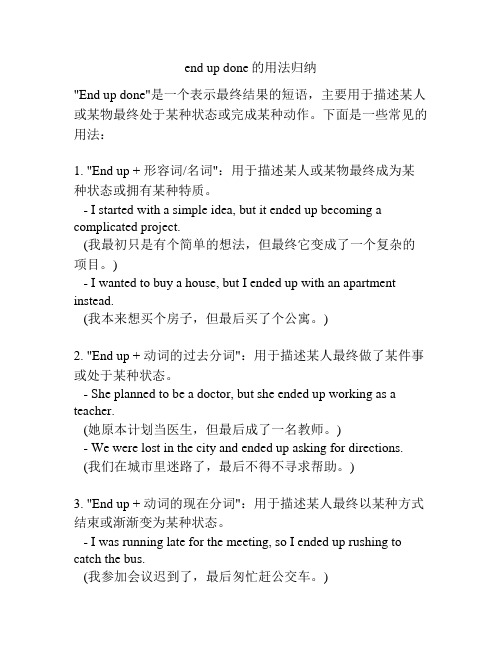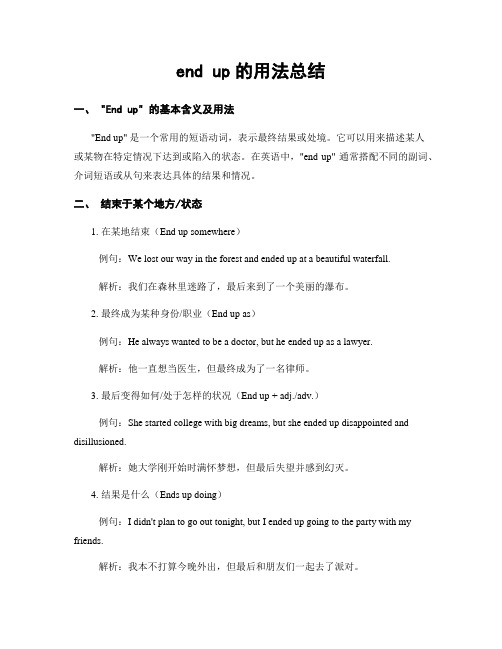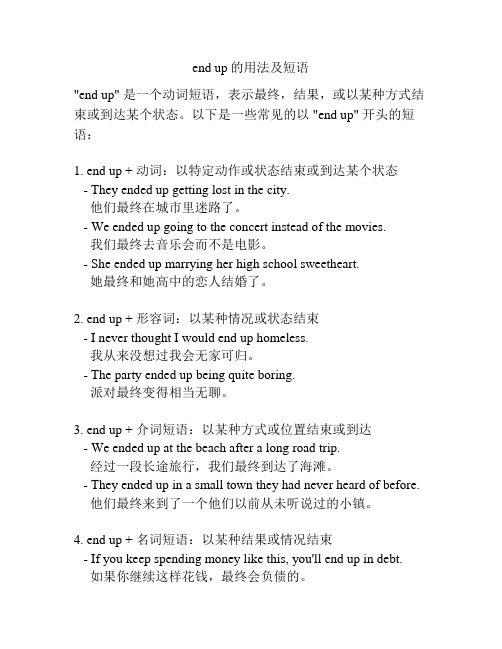end作动词的用法
end in的用法 -回复

end in的用法-回复“end in”的用法指的是某个词、短语或动词的最后部分是另一个词、短语或动词的形式。
这个用法常常用在描述某个物体、事物或动作的最后部分的特征或形态上。
以下是一篇关于“end in”的用法的1500-2000字文章:标题:Exploring the Use of "End In"导语:在英语语法中,有一种特殊的用法叫做“end in”。
这种用法常用来描述某个词、短语或动词的最后部分是另一个词、短语或动词的形式。
本文将深入探讨“end in”的用法,并提供一些例句来帮助读者更好地理解。
第一部分:基本概念和用法首先,我们需要了解“end in”是什么意思。
在这个用法中,“end”是一个动词,意思是“结束”或“以...结束”,而“in”则是一个介词,意思是“在...中”或“以...为结尾”。
因此,当我们说某个词或动词以另一个词或短语为结尾时,就可以使用“end in”的结构。
例如,我们可以说:“The word 'friend' ends in the letter 'd'.”(单词“friend”以字母‘d’结尾。
)在这个例句中,“end in”的结构将句子分为两个部分:主语和谓语。
主语是“the word 'friend'”(单词“friend”),谓语是“ends in the letter 'd'”(以字母‘d’结尾)。
通过这个例句,我们可以更好地理解“end in”的用法及其结构。
第二部分:常见用法接下来,我将介绍一些关于“end in”用法的常见场景。
首先,我们可以使用“end in”来描述某个词以特定字母或音节为结尾的特征。
例如:1. "The word 'book' ends in a 'k' sound."(单词'book'的结尾是一个'k'音。
end up done的用法归纳

end up done的用法归纳"End up done"是一个表示最终结果的短语,主要用于描述某人或某物最终处于某种状态或完成某种动作。
下面是一些常见的用法:1. "End up + 形容词/名词":用于描述某人或某物最终成为某种状态或拥有某种特质。
- I started with a simple idea, but it ended up becoming a complicated project.(我最初只是有个简单的想法,但最终它变成了一个复杂的项目。
)- I wanted to buy a house, but I ended up with an apartment instead.(我本来想买个房子,但最后买了个公寓。
)2. "End up + 动词的过去分词":用于描述某人最终做了某件事或处于某种状态。
- She planned to be a doctor, but she ended up working as a teacher.(她原本计划当医生,但最后成了一名教师。
)- We were lost in the city and ended up asking for directions.(我们在城市里迷路了,最后不得不寻求帮助。
)3. "End up + 动词的现在分词":用于描述某人最终以某种方式结束或渐渐变为某种状态。
- I was running late for the meeting, so I ended up rushing to catch the bus.(我参加会议迟到了,最后匆忙赶公交车。
)- The weather was so hot that we ended up swimming at the beach.(天气太热,我们最后在海滩游泳。
)请注意,"end up"后面接的动词可以用其原形、过去分词或现在分词形式,具体取决于句子的语境和需要。
end造句简单带翻译

end造句简单带翻译End is a versatile word that can be used in various contexts. In this article, we will explore the different ways in which "end" can be used in a sentence with simple translations.1. The party came to an end at midnight.这个派对在午夜结束了。
In this sentence, "end" is used as a noun to indicate the conclusion of the party.2. The company decided to end its partnership with the supplier.公司决定结束与供应商的合作关系。
In this sentence, "end" is used as a verb to indicate the termination of the partnership.3. The road comes to an end at the beach.这条路在海滩结束了。
In this sentence, "end" is used as a noun to indicate the point where the road stops.4. She was determined to see the project through to the end.她决心把这个项目做到底。
In this sentence, "end" is used as a noun to indicate the completion of the project.5. The teacher told the students to write a conclusion at the end of their essays.老师告诉学生在文章结尾写一个结论。
end up的用法总结

end up的用法总结一、 "End up" 的基本含义及用法"End up" 是一个常用的短语动词,表示最终结果或处境。
它可以用来描述某人或某物在特定情况下达到或陷入的状态。
在英语中,"end up" 通常搭配不同的副词、介词短语或从句来表达具体的结果和情况。
二、结束于某个地方/状态1. 在某地结束(End up somewhere)例句:We lost our way in the forest and ended up at a beautiful waterfall.解析:我们在森林里迷路了,最后来到了一个美丽的瀑布。
2. 最终成为某种身份/职业(End up as)例句:He always wanted to be a doctor, but he ended up as a lawyer.解析:他一直想当医生,但最终成为了一名律师。
3. 最后变得如何/处于怎样的状况(End up + adj./adv.)例句:She started college with big dreams, but she ended up disappointed and disillusioned.解析:她大学刚开始时满怀梦想,但最后失望并感到幻灭。
4. 结果是什么(Ends up doing)例句:I didn't plan to go out tonight, but I ended up going to the party with my friends.解析:我本不打算今晚外出,但最后和朋友们一起去了派对。
三、结果与意图不符/好转1. 意图不符(End up doing something different)例句:I was planning to study medicine, but I ended up studying business instead.解析:我本计划学医,但最终改学了商科。
end up的用法及短语

end up的用法及短语"end up" 是一个动词短语,表示最终,结果,或以某种方式结束或到达某个状态。
以下是一些常见的以 "end up" 开头的短语:1. end up + 动词:以特定动作或状态结束或到达某个状态- They ended up getting lost in the city.他们最终在城市里迷路了。
- We ended up going to the concert instead of the movies.我们最终去音乐会而不是电影。
- She ended up marrying her high school sweetheart.她最终和她高中的恋人结婚了。
2. end up + 形容词:以某种情况或状态结束- I never thought I would end up homeless.我从来没想过我会无家可归。
- The party ended up being quite boring.派对最终变得相当无聊。
3. end up + 介词短语:以某种方式或位置结束或到达- We ended up at the beach after a long road trip.经过一段长途旅行,我们最终到达了海滩。
- They ended up in a small town they had never heard of before.他们最终来到了一个他们以前从未听说过的小镇。
4. end up + 名词短语:以某种结果或情况结束- If you keep spending money like this, you'll end up in debt.如果你继续这样花钱,最终会负债的。
- He never expected to end up in such a successful career.他从未预料到会最终有如此成功的职业。
译林牛津7B第8单元知识点及练习

Unit 8 知识点及练习词汇1. something to eatsomething to eat意为“吃的东西”。
句中不定式短语to eat作后置定语,修饰不定代词something。
在英语中,动词不定式(短语)作定语修饰名词或代词时,常位于所修饰词的后面;something 为不定代词,不定代词的修饰语常后置。
例如:Mrs. Black has lots of clothes to wash. 布莱克夫人有许多衣服要洗。
(to wash修饰名词clothes) There is nothing interesting in the newspaper.报纸上没什么有趣的事。
(interesting 修饰不定代词nothing)2. holdhold 是动词,意为“举行,举办,召开”,常可以用have来替换,过去式和过去分词均为held。
例如:hold a meeting举行会议hold a concert举行音乐会hold a sports meeting举行运动会hold 保持;维持How long will this fine weather hold?这样的好天气能维持多久?抓住;握住;拿住He held the thief by the arm. 他抓住那个小偷的胳膊。
容纳;包含Our classroom can hold more than fifty students.教室能容纳50多个学生。
支撑……的重量The chair can’t hold your weight. 这把椅子不能承受你的重量。
短语atc catch hold of抓住;hold on(电话)别挂断;稍等3. feedfeed作及物动词,意为“喂养,饲养;向……供给”。
常用如下搭配:(1)feed…on sth.或feed sth. to…意为“给……喂……”。
Please feed some grass to the cow. = Please feed the cow on some grass. 请给牛喂点草。
短暂性动词与延续性动词的用法
初中英语中短暂性动词与延续性动词的用法英语中,按动词延续的时间长短,可将动词分为延续性动词和短暂性动词。
延续性动词如learn, study, work, play, wait等。
短暂性动词是非延续性动词,即动作一开始便结束的动词,又可称结束性动词,瞬间动词,如come, go, begin, start, become, join, end, die, buy, arrive,reach, borrow, lend, get to know等。
一.短暂性动词与延续性动词在现在完成时中的用法:现在完成时中用法(一):表示发生在过去,迄今已经完成,并对现在产生影响或产生结果的动作,常用ever, yet, already, just等状语,谓语动词既不过延续性动词,也不过短暂性动词。
如:She has just borrowed the book from the library.(borrow是短暂性动词)I have learned a little about Japanese. (learn 是延续性动词)现在完成时中用法(二):表示始于过去某时并一直延续到现在的动作或状态,常与表示始于过去某一时刻并一直延续到现在的时间状语连用。
如:They have lived in Nantong since 1990. (live 是延续性动词)Mr. Black has worked here since he came to China.(work 是延续性动词)I have learned English for two and a half years.(learn 是延续性动词)所以,在现在完成时中用法(二)中,在表示持续一段时间的句子中,应将短暂性动词转化为相同意义的延续性动词或状态动词。
初中英语中常见的有:例如:1. His grandfather has died for ten years.(F)His grandfather has been dead for ten years.(T) 2. My brother has joined the army for five years.(F)My brother has been in the army for five years.(T) My brother has been an armyman for ten years.(F)3. He has gone away for a week.(F) He has been away for a week.(T)4. The film has begun for fifteen minutes.(F)The film has been on for fifteen minutes.(T)但是,短暂性动词的现在完成时的否定形式能够表示一种延续的状态,所以能够和表示一段的状语连用。
end单词
end单词一、end单词- 单词释义:- 作名词时,有“末端;尽头;结束;结局;目的”等意思。
例如,“We are at the end of the road.”(我们在路的尽头。
)- 作动词时,表示“结束;终止”。
例如,“The movie will end soon.”(电影很快就要结束了。
)- 单词用法:- 作名词时,可用于短语“at the end of”(在……的末尾/尽头),如“At the end of the day, we were all tired.”(一天结束的时候,我们都累了。
)还可以说“in the end”(最后,终于),例如“In the end, he got what he wanted.”(最后,他得到了他想要的。
)- 作动词时,常见用法如“end with”(以……结束),“The concert ended with a beautiful song.”(音乐会以一首美妙的歌曲结束。
)- 近义词:- 名词近义词有“finish”(表示完成、结束的一个点,强调最后的部分),“conclusion”(更多指经过推理、论证后的结论或结束部分)。
例如,“The finish of the race was exciting.”(比赛的结尾很激动人心。
)“The conclusion of the book was unexpected.”(这本书的结局出乎意料。
)- 动词近义词有“finish”(完成,更侧重于完成一项任务或活动的全过程),“stop”(停止,强调动作的停止,不一定是完成或达到某个结局)。
例如,“I need to finish my homework.”(我需要完成我的家庭作业。
)“The car stopped suddenly.”(汽车突然停了下来。
)- 短语搭配:- “end up”(最终成为;最后处于),例如“You might end up loving this place.”(你可能最终会爱上这个地方。
end up的5种用法 -回复
end up的5种用法-回复end up表示“最终处于某种状态或位置”,是一个常用的短语动词。
它可以用于不同的语境和句式中,有五种常见的用法。
本文将逐步解释end up 的五种用法,并举例说明。
一、end up + doing sth.第一种用法是end up + doing sth.,表示最终做某事。
这种结构通常表示意外或不计划的结果,暗示事态发展出乎意料。
例如:1. I wanted to study medicine, but I ended up becoming a teacher.我本想学医,但最终成了一名教师。
2. We planned to have a picnic, but it ended up raining all day.我们打算去野餐,但最后一整天都下雨了。
3. She wanted to be an actress, but she ended up working in an office.她本想成为一名演员,但最后在一家办公室工作。
二、end up + adj.第二种用法是end up + adj.,表示最终成为某种状态。
这种结构通常用来描述某人或某物达到了某种不太理想或预期的状况。
例如:1. He started gambling and ended up broke.他开始,最后一贫如洗。
2. They planned a lavish wedding, but they ended up bankrupt.他们策划了一场豪华婚礼,但最后破产了。
3. The project was delayed multiple times and ended up abandoned.这个项目多次延期,最后被废弃了。
三、end up + in + 地点第三种用法是end up + in + 地点,表示最终到达某个地方或处于某个地方。
这种结构常用于描述人或物体的位置变化。
end up的几种常见用法
end up的几种常见用法“end up”在英语中有多种常见用法,它通常表示某件事情的最终结果或结局。
以下是几种常见的用法:1. 表示最终状态或结果:“end up”可以用于描述一系列动作或事件后的最终状态或结果。
例句:After a long day of traveling, we ended up at a small hotel in the mountains. (经过一整天的旅行,我们最终在山中的一家小旅馆落脚。
)2. 表示意外或不如意的结果:有时,“end up”可以用于描述一个不如预期或意外的结果。
例句:I had planned to go out with friends, but I ended up staying home sick. (我原计划和朋友出去,但最终因为生病而留在了家里。
)3. 用于疑问句或条件句中:在疑问句或条件句中,“end up”可以用于询问或描述可能的最终结果。
例句:If you keep studying hard, where do you think you'll end up? (如果你继续努力学习,你认为你最终会达到什么水平?)4. 与动词的现在分词形式连用:“end up”可以与动词的现在分词形式连用,表示最终处于某种状态或进行某种活动。
例句:After the party, we all ended up dancing on the table. (派对结束后,我们最终都站在桌子上跳舞。
)5. 表示经过一系列事件后的结论或总结:“end up”也可以用于描述一系列事件或经历后的总结或结论。
例句:After considering all the options, we ended up choosing the most expensive one. (在考虑了所有选项后,我们最终选择了最贵的那一个。
)请注意,“end up”的具体含义和用法可能因上下文而异,因此在理解和使用时需要考虑具体的语境。
- 1、下载文档前请自行甄别文档内容的完整性,平台不提供额外的编辑、内容补充、找答案等附加服务。
- 2、"仅部分预览"的文档,不可在线预览部分如存在完整性等问题,可反馈申请退款(可完整预览的文档不适用该条件!)。
- 3、如文档侵犯您的权益,请联系客服反馈,我们会尽快为您处理(人工客服工作时间:9:00-18:30)。
end作动词的用法
一、end作为动词的基本用法及表示方式
结束,停止或完结某种状态或行为。
在英语中,end作为一个常见的动词,有多种用法和表示方式。
本文将详细介绍end的一些基本用法及其不同的表达方式。
1. 结束某事物或事件
end可用于表示结束某事物或事件,并可以与不同名词搭配使用,如:
- The meeting ended at 5 p.m.(会议在下午5点结束)
- My vacation ends tomorrow.(我假期明天结束)
2. 终结关系或合作
end也可以用来指终结人际关系、合作关系等。
常见的表达方式有:
- We decided to end our friendship.(我们决定终止友谊)
- They agreed to end their business partnership.(他们同意结束合伙关系)
3. 转变为某种状态
还可以使用end来描述转变为某种状态,例如:
- The day ended in disappointment.(那一天以失望告终)
- Their relationship ended in marriage.(他们的恋情以婚姻收场)
4. 消失或废止
同时,end也可用于指消失或废止,例如:
- The friendship ended with his betrayal.(这段友谊以他的背叛而破裂)
- The policy may soon end.(这项政策可能很快废止)
二、end作为动词的相关短语和习语用法
除了基本的用法外,end作为动词还有一些相关短语和习语,增加了其使用范围和表达方式。
1. come to an end
表示某事物或过程结束,常与事件、活动或期限等搭配使用。
- The movie finally came to an end after three hours.(电影经过三小时终于结束了)
- Our vacation is coming to an end.(我们的假期即将结束)
2. put an end to
意思是终结或停止某种行为或状态。
- We need to put an end to this argument and find a solution.(我们需要结束这场争论并找到解决方法)
- The police hope to put an end to the criminal activities in the area.(警方希望终结该地区的犯罪活动)
3. bring something to an end/close
表示使某事物完全结束。
- The negotiations brought the dispute to a close.(谈判使纠纷完全解决)
- The manager decided to bring the project to an end due to budget constraints.(由于预算限制,经理决定终止该项目)
4. be at the receiving/beginning/other end of something
表示承受某种待遇、行为或结果。
- She was at the receiving end of his anger.(她遭受了他的愤怒)
- He always seems to be at the beginning end of any mischief.(他似乎总是开创
任何恶作剧)
5. make ends meet
意为维持生计或收支平衡。
- With the rising cost of living, it's becoming harder to make ends meet.(随着生
活成本的上涨,勉强维持生计越来越困难)
- They work multiple jobs to make ends meet.(他们从事多份工作以维持收支平衡)
三、end作为动词时的常见误用
在使用end作为动词时,有一些常见的误用需要注意避免。
1. 不要将end用于表示完全控制或毁灭。
例如,错误用法:"He wanted to end her career." (他想摧毁她的职业生涯。
)正确用法:"He wanted to ruin her career." (他想毁了她的职业生涯。
)
2. 不要将end与比较级连用。
例如,错误用法:"She ended more quickly than him." (她比他更快地结束了。
)
正确用法:"She ended more quickly than he did." (她比他更快地结束了。
)
3. 不要过度使用"end up"短语。
"end up"表示最终处于某个状况,但过度使用会使文章显得啰嗦冗长。
应尽量选择其他表达方式。
例如,错误用法:"I ended up going to the party and ended up regretting it." (我最终去了派对,结果后悔了。
)
正确用法:"I went to the party and regretted it in the end."(我最终去了派对,结果后悔了。
)
四、总结
end作为一个常见的动词,有多种用法和表达方式。
它可以表示结束某事物或事件,终结关系或合作以及转变为某种状态。
相关的短语如come to an end、put an end to、bring something to an end等进一步丰富了其用法。
在使用end时需要注意避免常见误用,并寻找替代表达方式使文章更具准确性和流畅性。
